

Welcome to Flow in Games. Abstract | Introduction | Foundation | Design Flow in Games | Implement Flow in Games | Conclusion | Bibliography Abstract This thesis provides a unique game design methodology to realize player-centric Dynamic Difficulty Adjustment (DDA) in video games, which creates optimized video game experiences for different types of players.
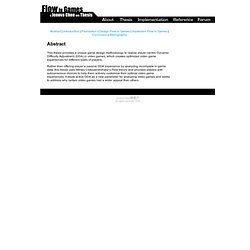
Rather than offering player a passive DDA experience by analyzing incomplete in-game data, this thesis uses Mihaly Csikszentmihalyi’s Flow theory and provides players with subconscious choices to help them actively customize their optimal video game experiences. It treats active DDA as a new parameter for analyzing video games and seeks to address why certain video games had a wider appeal than others. Meaningful Flow Engineering - some examples and possibilities.
In my previous post, I looked at how computer games and related technologies can operate as ‘motivation engines’.
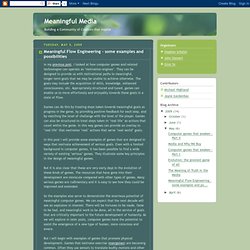
They can be designed to provide us with motivational paths to meaningful, longer-term goals that we may be unable to achieve otherwise. The goals may include the acquisition of skills, knowledge, enhanced consciousness, etc. Appropriately structured and tuned, games can enable us to move effortlessly and enjoyably towards these goals in a state of Flow. Games can do this by treating steps taken towards meaningful goals as progress in the game, by providing positive feedback for each step, and by matching the level of challenge with the level of the player. 'Flow Engineering' using computer games. This is the first of a series of posts that sketch some ways in which computer game frameworks can be used to promote the positive development of humanity, both as individuals and collectively.
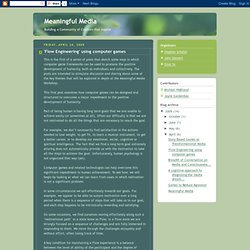
The posts are intended to stimulate discussion and sharing about some of the key themes that will be explored in depth at the Meaningful Media Workshop. This first post examines how computer games can be designed and structured to overcome a major impediment to the positive development of humanity. The Seven Habits of Highly Effective People. The 7 Habits of Highly Effective People, first published in 1989, is a business and self-help book written by Stephen R.
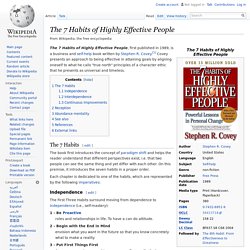
Covey.[1] Covey presents an approach to being effective in attaining goals by aligning oneself to what he calls "true north" principles of a character ethic that he presents as universal and timeless. The 7 Habits[edit] The book first introduces the concept of paradigm shift and helps the reader understand that different perspectives exist, i.e. that two people can see the same thing and yet differ with each other. On this premise, it introduces the seven habits in a proper order.
Each chapter is dedicated to one of the habits, which are represented by the following imperatives: Independence[edit] The First Three Habits surround moving from dependence to independence (i.e., self-mastery): The Science of How Your Mind-Wandering Is Robbing You of Happiness. By Maria Popova Why the secret of life remains in the living.
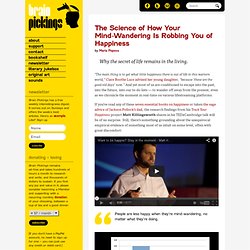
“The main thing is to get what little happiness there is out of life in this wartorn world,” Clare Boothe Luce advised her young daughter, “because ‘these are the good old days’ now.” And yet most of us are conditioned to escape into the past, into the future, into our to-do lists — to wander off away from the present, even as we chronicle the moment in real-time on various lifestreaming platforms. Personal Alignment Precedes Group Flow. I spent last week in an immersive personal development / coaching / business development retreat with a colleague, which spurred me to some new insights and opinions about collective intelligence, co-creation, and the general pursuit of goals and growth in life.
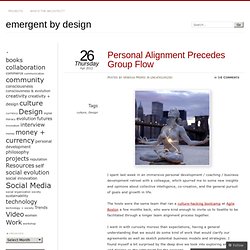
The hosts were the same team that ran a culture-hacking bootcamp at Agile Boston a few months back, who were kind enough to invite us to Seattle to be facilitated through a longer team alignment process together. I went in with curiosity moreso than expectations, having a general understanding that we would do some kind of work that would clarify our agreements as well as sketch potential business models and strategies. I found myself a bit surprised by the deep dive we took into exploring emotions and desires as the entrypoint for the sessions. Exploring Personal Alignment. Mihaly Csikszentmihalyi: Flow, the secret to happiness. Mihaly Csikszentmihalyi. Mihaly Csikszentmihalyi (/ˈmiːhaɪ ˌtʃiːksɛntməˈhaɪ.iː/ MEE-hy CHEEK-sent-mə-HY-ee; Hungarian: Csíkszentmihályi Mihály Hungarian: [ˈtʃiːksɛntmihaːji ˈmihaːj] ( ); born (1934-09-29) 29 September 1934 (age 79), in Fiume, Italy – now Rijeka, Croatia, Europe) is a Hungarian psychology professor, who emigrated to the United States at the age of 22.
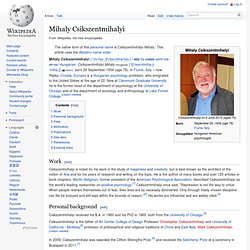
Now at Claremont Graduate University, he is the former head of the department of psychology at the University of Chicago and of the department of sociology and anthropology at Lake Forest College. [citation needed] Work[edit] Personal background[edit] Csikszentmihalyi received his B.A. in 1960 and his PhD in 1965, both from the University of Chicago.[4] Mihaly Csikszentmihalyi: Creativity, fulfillment and flow. Mesurer le Flow : vers la construction de Flow4D-16 (Heutte, 2009. Flow: The Psychology of Optimal Experience: Amazon.fr: Mihaly Csikszentmihalyi: Livres anglais et étrangers. Hyperconscience au service de la complexité & de la performance - secrets du mental. Le FLOW : l'expérience optimale ou autotélique (Csikszentmihalyi, 1990, 2004, 2005.
Article mis à jour le 19 mars 2011 Dans le souci d'identifier les conditions qui caractérisent les moments décrits par les gens comme étant parmi les meilleurs moments de leur vie, Csikszentmihalyii (1975) a interrogé des alpinistes, des joueurs d’échec, des compositeurs de musique et bien d’autres personnes qui consacrent beaucoup de temps et d’énergie à des activités pour le simple plaisir de les faire sans recherche de gratifications conventionnelles comme l’argent ou la reconnaissance sociale.
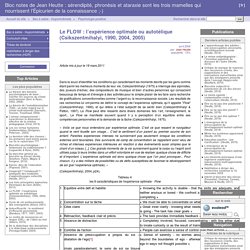
La thèse soutenue le 18 mars 2011 - Bloc-notes de Jean Heutte : sérendipité, phronèsis et atharaxie sont les trois mamelles qui nourrissent l'Épicurien de la connaissance ;-) Les 8 caractéristiques de l’état de flow. L’état de flow est un état de concentration intense où l’individu se sent complètement absorbé par ce qu’il fait.
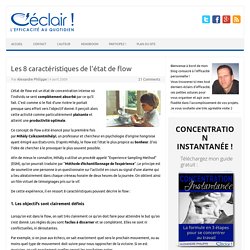
C’est comme si le flot d’une rivière le portait presque sans effort vers l’objectif donné. Il perçoit alors cette activité comme particulièrement plaisante et atteint une productivité optimale. Le FLOW : l’expérience optimale ou autotélique (Csikszentmihalyi, 1990, 2004, 2005) avril 2006, par Jean Heutte. Beyond arousal and control: “Flow” I really like this visual depiction of flow.
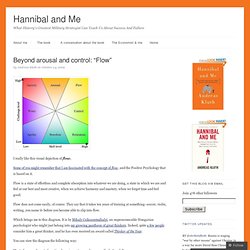
Some of you might remember that I am fascinated with the concept of flow, and the Positive Psychology that is based on it. Flow is a state of effortless and complete absorption into whatever we are doing, a state in which we are and feel at our best and most creative, when we achieve harmony and mastery, when we forget time and feel good. Flow does not come easily, of course. They say that it takes ten years of training at something–soccer, violin, writing, you name it–before you become able to slip into flow. Which brings me to this diagram. You can view the diagram the following way: How to Achieve the Creative State of Flow. That’s called “flow” – a state of consciousness where we experience a task so deeply that it truly becomes enjoyable and satisfying. For me this usually happens while I’m reading, writing, or developing software. For you, it could happen during any number of tasks — golfing, cooking, hiking, etc.
Mihaly Csikszentmihalyi is the architect of Flow and he wrote Flow: The Psychology of the Optimal Experience. A guide that shows us how to add more enjoyment in our lives by increasing the time we spend in Flow. Théorie du flow. Cet article est incomplet. Il est jugé trop incomplet dans son développement ou dans l'expression des concepts et des idées. Son contenu est donc à considérer avec précaution. Flow Psychology. Le flow, agir sans attendre de récompense externe.
Version du vendredi 27 janvier 2012 L’objectif de réalisation personnelle est un moyen d’encourager certains comportements. Flow (psychology) Concentrating on a task is one aspect of flow. In positive psychology, flow, also known colloquially as being in the zone, is the mental state of operation in which a person performing an activity is fully immersed in a feeling of energized focus, full involvement, and enjoyment in the process of the activity.
Flow (psychologie) Flow Genome Project. All about flow. Mihaly Csikszentmihalyi, author of “Flow: The Psychology of Optimal Experience,” describes flow as “being completely involved in an activity for its own sake. The ego falls away. Time flies. Every action, movement, and thought follows inevitably from the previous one, like playing jazz. Your whole being is involved, and you’re using your skills to the utmost.”
Fear and Flow. There’s a problem in football. The problem is that owners want to win and they want to win yesterday. Unfortunately, not everyone gets to win. In fact, only one team does—which is, as they say, why they play the games. And while not everyone can win, everyone really can be fired. Firing coaches has become the cause-du-jour in football as of late.
The 2008-2009 football season is not even over (okay it’s almost over, but we do have one week to go) and a ton of people have been let go. It doesn’t even include all the position coaches who have lost jobs alongside the head coaches—and there were plenty of those. Finding flow. We all are capable of reaching that stateof effortless concentration and enjoyment called "flow. " Here, the man who literally wrote the book on flow presents his most lucid account yet of how to experience this blissful state. IMAGINE THAT YOU ARE SKIING DOWN A SLOPE and your full attention is focused on the movements of your body and your full attention is focused on the movements of your body, the position of the skis, the air whistling past your face, and the snow-shrouded trees running by. There is no room in your awareness for conflicts or contradictions; you know that a distracting thought or emotion might get you buried face down in the snow.
The run is so perfect that you want it to last forever. If skiing does not mean much to you, this complete immersion in an experience could occur while you are singing in a choir, dancing, playing bridge, or reading a good book. Flow Theory - Kay McMahon's research website. 24 Hours Of Living ‘In The Flow’ « We The Change, Personal Development for Conscious People. Have you ever experien ced a period of time where it felt like everything you did was perfectly in flow with the way you should be living your life? When it happens you usually encounter a high frequency of coincidences, or what I prefer to call synchronicities.
Mental State Called Flow. A number of sources, most recently ProgrammingOutsideTheCube and the RingerTape page, say that many folk find it takes time to get into a state where work flows. Do you plan to get into flow, does it come upon you more as a kind of inspiration, or is it not necessary for you? Do you use tactics to improve your team's ability to flow?